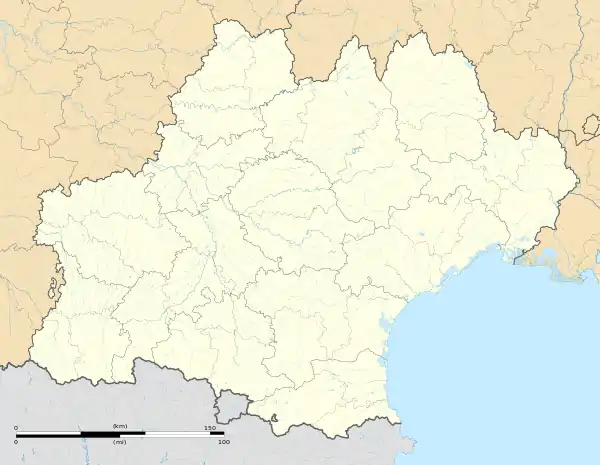Garrigues-Sainte-Eulalie
Garrigues-Sainte-Eulalie (French pronunciation: [gaʁig sɛ̃t‿ølali]; Provençal: Garriga e Senta Olha) is a commune in the Gard department in southern France. It lies 54 km (34 mi) from Montpellier.
Garrigues-Sainte-Eulalie | |
|---|---|
.svg.png.webp) Coat of arms | |
Location of Garrigues-Sainte-Eulalie 
| |
 Garrigues-Sainte-Eulalie  Garrigues-Sainte-Eulalie | |
| Coordinates: 43°59′39″N 4°18′57″E | |
| Country | France |
| Region | Occitanie |
| Department | Gard |
| Arrondissement | Nîmes |
| Canton | Uzès |
| Government | |
| • Mayor (2020–2026) | Didier Kielpinski[1] |
| Area 1 | 10 km2 (4 sq mi) |
| Population (2017-01-01)[2] | 731 |
| • Density | 73/km2 (190/sq mi) |
| Time zone | UTC+01:00 (CET) |
| • Summer (DST) | UTC+02:00 (CEST) |
| INSEE/Postal code | 30126 /30190 |
| Elevation | 75–215 m (246–705 ft) (avg. 120 m or 390 ft) |
| 1 French Land Register data, which excludes lakes, ponds, glaciers > 1 km2 (0.386 sq mi or 247 acres) and river estuaries. | |
Population
The residents are called Garrigois.
| Year | Pop. | ±% |
|---|---|---|
| 1962 | 228 | — |
| 1968 | 253 | +11.0% |
| 1975 | 281 | +11.1% |
| 1982 | 304 | +8.2% |
| 1990 | 388 | +27.6% |
| 1999 | 516 | +33.0% |
| 2008 | 728 | +41.1% |
History
Traces of the early peoples of the "Fontbouisse culture" have been discovered, as well as many Roman ruins. The area was a feudal domain belonging to the Duke of Uzès.
Before 1789 this commune was in two parts: Garrigues and Sainte-Eulalie. During the French Revolution the two communes were combined and given the name Canteperdrix. In 1814 the combined commune was maintained under the name Garrigues-et-Sainte Eulalie, and on 16 February 1976 the current hyphenated form was adopted.[3]
Economy
The local economy includes general agriculture, vineyards. orchards and sheep raising.
Architecture
The 19th century Sainte-Eulalie Church was built on the ruins of a former fortified castle, which burned in 1704. Its tower is now the clock-tower of the church. The castle was deeded to the Bourdic factory in the 19th century. There is a later, 19th century, castle in the Garrigues region of the town.
See also
References
- "Répertoire national des élus: les maires". data.gouv.fr, Plateforme ouverte des données publiques françaises (in French). 2 December 2020. Retrieved 7 December 2020.
- "Populations légales 2017". INSEE. Retrieved 6 January 2020.
- FranceGenWeb site.